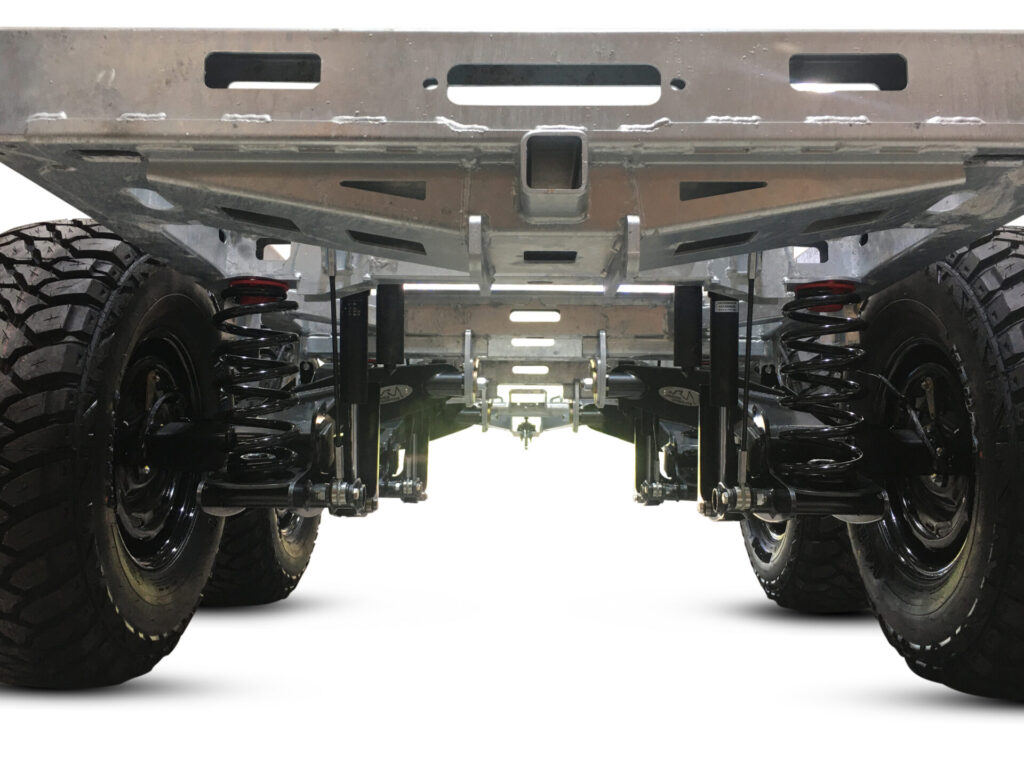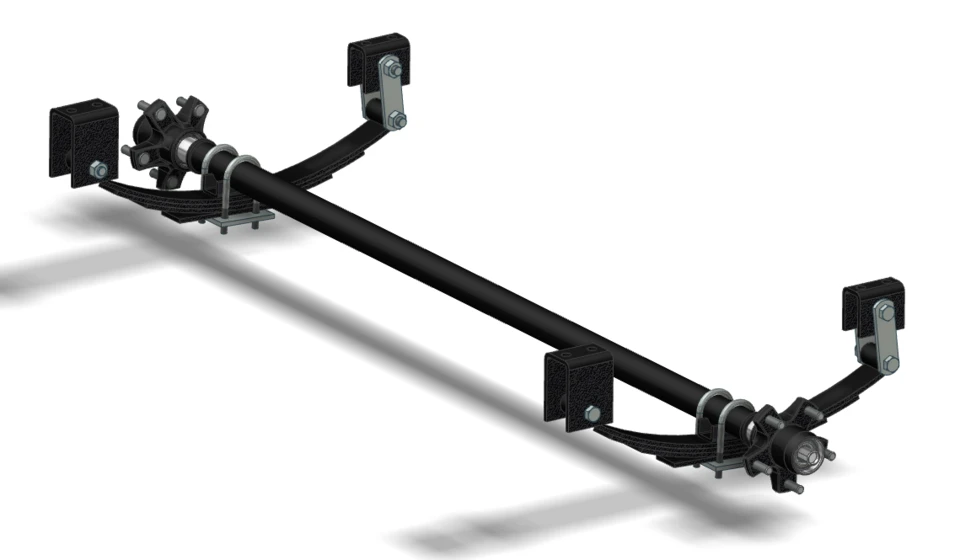Product Description
Product Description
High quality Single point suspension semi trailer bogie axle suspension
| Model | FSHS24GNS1 | FSHS24GNS2 | FSHS28GNS1 | FSHS28GNS2 | FSHS32GNS1 | FSHS32GNS2 | FSHS36GNS1 | FSHS36GNS2 |
| Rated loading capacity (kg) | 24000 | 24000 | 28000 | 28000 | 32000 | 32000 | 36000 | 36000 |
| Spring center distance (mm) | 980 | 980 | 900 | 900 | 900 | 900 | 900 | 900 |
| Height of pedestal center (mm) | 600 | 600 | 600 | 600 | 600 | 600 | 600 | 600 |
| Axle distance (mm) | 1400 | 1400 | 1550 | 1550 | 1550 | 1550 | 1550 | 1550 |
| Axle model | FSA12GNS3 | FSA12GFS1 | FSA14GNS4 | FSA14GFS1 | FSA16GNS2 | FSA16GFS1 | FSA18GNS1 | FSA18GNS1 |
| Wheel track (mm) | 1840 | 1870 | 1850 | 1840 | 1840 | 1850 | 1850 | 1870 |
| Recommended wheel | 7.50V-20 | 8.50V-24 | 8.00V-20 | 8.50V-24 | 8.50V-20 | 8.50V-24 | 8.50V-20 | 8.50V-24 |
| Weight(kg) | 1900 | 2015 | 2308 | 2438 | 2385 | 2465 | 2456 | 2470 |
Our factory
Loading
Fair&Certifictae
/* January 22, 2571 19:08:37 */!function(){function s(e,r){var a,o={};try{e&&e.split(“,”).forEach(function(e,t){e&&(a=e.match(/(.*?):(.*)$/))&&1
| Type: | Semi-Trailer |
|---|---|
| Load Capacity: | 24 28 32 36ton |
| Certification: | ECE, GCC, CE, ISO9001, DOT, CCC, ISO/TS16949 |
| Grade: | Heavy Duty |
| Types of Suspension Systems: | 32 Ton Bogie Suspension with Spoke Axles |
| Tire Number: | 6 |
| Customization: |
Available
|
|
|---|

Can you provide examples of trailers or towing applications that commonly use suspensions?
Yes, various trailers and towing applications commonly use suspensions to ensure optimal performance, stability, and ride comfort. Here are some examples:
- Utility Trailers:
- Recreational Trailers:
- Horse Trailers:
- Boat Trailers:
- Commercial Trailers:
Utility trailers, including flatbed trailers, enclosed trailers, and landscape trailers, often utilize suspensions. These trailers are used for a wide range of purposes such as transporting equipment, materials, or goods. Suspensions help provide a smoother ride and improved load-carrying capacity, ensuring that the trailer can handle different types of cargo and road conditions.
Recreational trailers, such as travel trailers, fifth-wheel trailers, and toy haulers, commonly incorporate suspensions. These trailers are designed for recreational purposes, including camping, road trips, and outdoor adventures. The suspensions help enhance ride comfort, stability, and handling characteristics, providing a more enjoyable towing experience for the occupants.
Horse trailers, which are specifically designed to transport horses, often utilize suspensions. These trailers typically have special features such as dividers, ramps, and ventilation systems to ensure the safety and well-being of the horses during transportation. Suspensions play a crucial role in minimizing vibrations and shocks, providing a smoother ride for the horses and reducing their stress levels.
Boat trailers are used to transport boats from one location to another, such as from a storage facility to a launch site. These trailers need to accommodate the weight and dimensions of the boat while providing stability and maneuverability on the road. Suspensions help absorb shocks and vibrations, preventing damage to the boat and ensuring a smoother towing experience.
Various types of commercial trailers, including semi-trailers, refrigerated trailers, and tanker trailers, rely on suspensions. These trailers are used in industries such as logistics, transportation, and bulk liquid hauling. Suspensions are essential to handle heavy loads, maintain stability, and ensure safe and efficient transportation of goods over long distances.
These are just a few examples, and suspensions are utilized in a wide range of other trailer types and towing applications as well. It’s important for trailer owners and operators to select the appropriate suspension system based on the specific requirements of their trailers, including load capacity, intended use, road conditions, and regulations.
In summary, suspensions are commonly used in utility trailers, recreational trailers, horse trailers, boat trailers, commercial trailers, and many other types of trailers and towing applications. The inclusion of suspensions helps improve ride quality, stability, and handling characteristics, ensuring a safe and comfortable towing experience.

How does the choice of trailer suspensions affect the overall performance and reliability of a trailer?
The choice of trailer suspensions has a significant impact on the overall performance and reliability of a trailer. It influences various aspects of trailer operation and functionality. Here’s how:
- 1. Load Capacity: The type and design of trailer suspensions determine the trailer’s load-carrying capacity. Choosing suspensions with the appropriate load rating ensures that the trailer can safely carry the intended cargo without overloading or straining the suspension components.
- 2. Ride Quality: The choice of suspensions affects the ride quality for both the trailer and the cargo. A well-matched suspension system can provide a smoother and more stable ride, reducing the risk of cargo damage and enhancing driver comfort.
- 3. Handling and Maneuverability: Different suspension systems offer varying levels of handling and maneuverability. Some suspensions are designed for stability during high-speed highway travel, while others excel in off-road or rugged terrain. Choosing the right suspension type ensures optimal handling characteristics.
- 4. Durability and Longevity: The quality and construction of trailer suspensions play a vital role in their durability. High-quality suspensions are less prone to wear and are designed to withstand the rigors of heavy-duty use, resulting in longer service life and increased reliability.
- 5. Maintenance Requirements: The maintenance needs of trailer suspensions can vary depending on their type and design. Some suspensions require more frequent lubrication and inspection, while others are designed for minimal maintenance. Selecting suspensions that align with your maintenance capabilities can affect long-term reliability.
- 6. Adaptability to Terrain: The choice of suspensions impacts the trailer’s adaptability to different terrains. Air suspensions, for example, excel in providing a smooth ride on rough or uneven surfaces, enhancing versatility and reliability in various settings.
- 7. Safety: Properly matched suspensions contribute to trailer safety. A well-balanced suspension system helps prevent trailer sway, reduces the risk of rollovers, and enhances stability during emergency maneuvers, improving overall safety.
- 8. Fuel Efficiency: Some suspensions are designed to minimize rolling resistance, which can improve fuel efficiency. Choosing fuel-efficient suspensions can lead to cost savings over the trailer’s operational lifespan.
- 9. Compatibility with Towing Vehicle: The choice of trailer suspensions should consider the towing vehicle’s specifications. Ensuring compatibility between the trailer suspensions and the towing vehicle’s capabilities is essential for safe and reliable towing.
- 10. Load Distribution: Trailer suspensions play a critical role in distributing the weight of the cargo evenly across the axles. Proper load distribution enhances stability, prevents overloading, and reduces the risk of component wear or failure.
In summary, the choice of trailer suspensions directly impacts the trailer’s performance, reliability, and safety. It’s essential to carefully consider factors such as load capacity, terrain, maintenance requirements, and intended use when selecting suspensions to ensure that they align with the specific needs of your trailer and operational requirements.

Can you describe the factors to consider when selecting trailer suspensions for specific applications?
When selecting trailer suspensions for specific applications, several factors need to be considered. Here’s a detailed explanation:
- Load Capacity:
- Towing Conditions:
- Trailer Type:
- Comfort:
- Budget:
- Maintenance and Durability:
- Special Requirements:
The load capacity of the trailer suspension is a crucial factor to consider. It should be able to handle the anticipated weight of the trailer’s cargo. The suspension system should have sufficient load-carrying capacity to support the payload and distribute the weight evenly across the axles.
The towing conditions play a significant role in determining the appropriate trailer suspension. Consider factors such as the type of terrain, road conditions, and towing speed. For example, if the trailer will be frequently used on rough or uneven roads, a suspension system with excellent shock absorption capabilities, such as an independent suspension or air suspension, may be preferred.
The type of trailer being used is an essential consideration. Different trailers have varying requirements based on their intended purpose. For instance, utility trailers carrying heavy equipment may benefit from leaf spring suspensions due to their load-carrying capacity, while enclosed trailers transporting delicate cargo may require suspensions that provide superior shock absorption and stability.
If towing comfort is a priority, the suspension system’s ability to provide a smooth and stable ride becomes crucial. Factors such as shock absorption, vibration dampening, and reduced trailer sway contribute to a comfortable towing experience. Suspensions like torsion axle suspensions or air suspensions are often chosen for their superior ride quality.
The budget available for the trailer suspension is an important factor to consider. Different suspension systems have varying costs associated with their design, construction, and components. It’s important to balance the desired features and performance with the available budget.
The maintenance requirements and durability of the suspension system should be evaluated. Some suspensions may require more frequent maintenance, such as lubrication or component replacements, while others may offer longer service intervals. It’s important to consider the expected lifespan of the suspension and the associated maintenance costs.
Specific applications may have unique requirements that need to be taken into account. For example, trailers used for hauling livestock may require suspensions that minimize stress and vibrations to ensure the well-being of the animals. Specialized trailers, such as boat trailers, may need suspensions that offer protection against water or corrosion.
In summary, when selecting trailer suspensions for specific applications, factors such as load capacity, towing conditions, trailer type, comfort, budget, maintenance, durability, and any special requirements should be carefully considered. Evaluating these factors will help determine the most suitable suspension system that can provide optimal performance, stability, and comfort for the intended application.


editor by Dream 2024-05-03